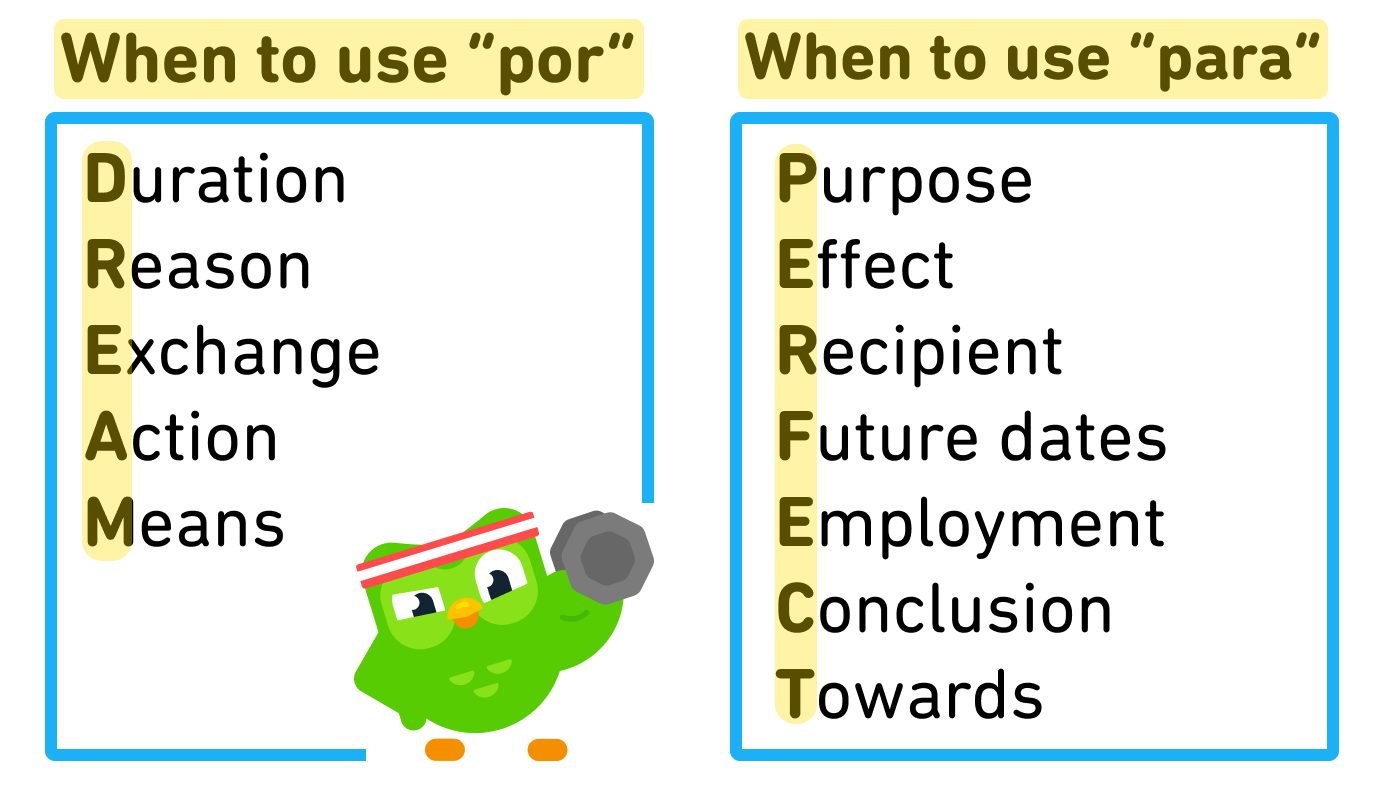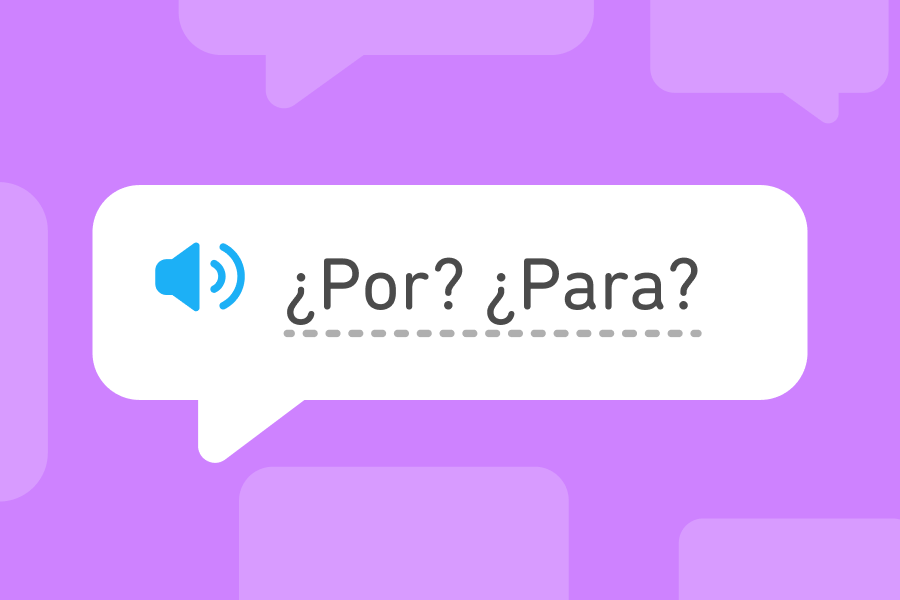The Spanish words por and para can both mean "for," and choosing which one to use can be tricky. Luckily, they're used in different phrases and contexts! Let’s take a look at some tips and tricks so the next time you have to choose between por and para, you will know exactly which one to use!

When to use por in Spanish
Por is a preposition that is used in specific situations. An easy way to remember when you need to use por is by remembering the acronym DREAM: Each letter in DREAM provides a simple rule for when you'll use por!
| Situation | Example (from song lyrics!) | |
|---|---|---|
| D | Duration Use por when you want to talk about a length of time (the duration of something) |
🎶 Te amaría por mil años más 🎶 I'd love you for a thousand years more "Amarte por mil años más" de Yadi Fernández |
| R | Reason (because of) Use por when you want to express a reason for doing something |
🎶 Y es por tí, que late mi corazón 🎶 And it's because of you, that my heart beats "Es por tí" de Juanes (Read about his journey learning English!) |
| E | Exchange Use por when you want to talk about an exchange or a substitution |
🎶 Quisiera cambiar mi corazón por otro que no te esté amando 🎶 I would like to exchange my heart for another one that isn’t loving you. "Cambio mi corazón" de Grupo 5 |
| A | Action Here, por refers to where an action takes place |
🎶 Ayer la vi, bailando por ahí con sus amigas en una calle de Madrid 🎶 Yesterday I saw her, dancing around with her friends on a street in Madrid. "Bailando por ahí" de Juan Magán |
| M | Means Use por when you want to talk about means of transportation or communication |
🎶 Si me llaman por teléfono, no estoy 🎶 If someone calls me on the phone, I am not here. "Si me llaman por teléfono, no estoy" de Gustavo Santaolalla |
You will also notice that you need to use por for very important expressions:
| Expression with POR | Translation |
|---|---|
| por favor | please |
| por eso | therefore / because of this |
| por supuesto | of course |
| por ejemplo | for example |
| por lo general | in general |
| por la mañana (por la tarde, por la noche) | in the morning (in the afternoon, in the evening) |
| gracias por... | thank you for... |
When to use para in Spanish
Just like por, para also has distinct uses in Spanish. An easy way to remember when you should use para is by remembering the acronym PERFECT: Each letter stands for one of the situations in which you'll use para!
| Situation | Example (from song lyrics!) | |
|---|---|---|
| P | Purpose (in order to) Use para when you want to express purpose |
🎶 Yo solo quiero pegar en la radio, para ganar mi primer millón 🎶 I just want to be a hit on the radio, in order to earn my first million "Mi primer millón" de Bacilos |
| E | Effect Use para when you want to express a goal or the effect something has on something else |
🎶 Yo romperé tus fotos, yo quemaré tus cartas, para no verte más 🎶 I will rip all your photos, I will burn all your letters to never see you again "Para no verte más" de La Mosca Ts Ts |
| R | Recipient Use para when you want to talk about the recipient of something or an action |
🎶 Mil rosas para mí 🎶 A thousand roses for me "Rosas" de La oreja de Van Gogh |
| F | Future dates Use para when you want to talk about deadlines, or moments in time in the future |
🎶 ¿Qué dejaremos para mañana? 🎶 What will we leave for tomorrow? "Para mañana" de Amanda Miguel" |
| E | Employment Use para when you want to talk about the organization or person you work for |
🎶 Ella trabaja para mí 🎶 She works for me. "Ella trabaja para mí" de Polanski y el Ardor |
| C | Conclusion Use para when you want to express a conclusion you have made about something or someone or to share your opinions |
🎶 Para mí, tú eres un cobarde 🎶 For me, you are a coward. "Cobarde" de Yahaira Plasencia |
| T | Toward (a specific destination) Use para when you want to talk about going to a specific place |
🎶 Vamos para la playa, para curarte el alma 🎶 Let’s go towards the beach in order to heal your soul "Calma (Remix)" de Pedro Capó & Farruko Bonus! Did you catch the extra use of para in this lyric? |
Por or para? Let’s try a few examples!
Keep in mind the DREAM uses for por and the PERFECT uses for para. You'll find the answer key at the end of the post.
Challenge 1
Take a look at the following sentences using por and para. Translate the sentence and use DREAM and PERFECT to decide why por or para was used.
Let's do one together:
| Translation | Reason | |
|---|---|---|
| Ella trabajó por 5 años. | She worked for 5 years. | D (Duration): We use por when talking about a length of time (the duration of something). |
Now it's your turn!
| Translation | Reason | |
|---|---|---|
| 1. Vamos para Miami. | ||
| 2. Mateo y Breanna caminan por el parque. | ||
| 3. La tarea es para el próximo viernes. | ||
| 4. Yo trabajo para Duolingo. | ||
| 5. Mark quiere cambiar los zapatos por los pantalones. |
How did you do? Too easy? Try these five when you are ready!
Challenge 2
Take a look at the following sentences and choose between por and para. Translate the sentence and use DREAM and PERFECT to decide between por and para.
| Translation | Reason | |
|---|---|---|
| 1. Yo estudio (por / para) dos horas. | ||
| 2. Por favor compra una pizza (por / para) Toby. | ||
| 3. Nosotros queremos ir a NY (por / para) visitar la Estatua de Libertad. | ||
| 4. Cole y Chris fueron a Suiza (por / para) avión. | ||
| 5. (Por / Para) Beverly, Vermont es muy bonito durante el otoño. |
And for extra practice on the go, check out our Spanish playlist on Spotify, which includes all the por and para songs from the DREAM and PERFECT examples! Music is a great way to practice the language you're learning.
Embedded iFrame
You'll be able to rest easy with this perfect dream!
While por and para can certainly be challenging, the more you practice and use them, the easier it will get for you to know which one you should use in different situations! Look out for more examples in your next Duolingo lessons and remember to think of DREAM and PERFECT to pick por or para.
And don't forget to check your answers below! How did you do? For more answers to your por and para questions, write to us at dearduolingo@duolingo.com.
Check here for the answers to the challenges!
Challenge 1
| Translation | Reason | |
|---|---|---|
| 1. Vamos para Miami. | Let’s go towards (to) Miami. | T (Toward): We use para when you want to talk about going to a specific place. |
| 2. Mateo y Breanna caminan por el parque. | Mateo and Breanna walk around the park. | A (Action): We use por when you want to talk about where an action takes place. |
| 3. La tarea es para el próximo viernes. | The homework is for next Friday. | F (Future dates): Use para when you want to talk about deadlines, or moments in time in the future. |
| 4. Yo trabajo para Duolingo. | I work for Duolingo. | E (Employment): We use para when you want to talk about the organization or person you work for. |
| 5. Mark quiere cambiar los zapatos por los pantalones. | Mark wants to exchange the shoes for the pants. | E (Exchange): Use por when you want to talk about an exchange or a substitution. |
Challenge 2
| Translation | Reason | |
|---|---|---|
| 1. Yo estudio por dos horas. | I study for two hours. | D (Duration): Here por refers to a length of time (the duration of something). |
| 2. Por favor compra una pizza para Toby. | Please buy a pizza for Toby. | R (Recipient): Para is used when you want to talk about the recipient of something or an action. |
| 3. Nosotros queremos ir a NY para visitar la Estatua de Libertad. | We want to go to NY (in order) to visit the Statue of Liberty. | P (Purpose (in order to)): Here, para expresses purpose. |
| 4. Cole y Chris fueron a Suiza por avión. | Cole and Chris went to Switzerland by plane. | M (Means): Por is used to talk about means of transportation or communication. |
| 5. Para Beverly, Vermont es muy bonito durante el otoño. | For Beverly, Vermont is very beautiful during the fall. | C (Conclusion): Use para to express a conclusion you have made about something or someone or to share your opinions. |



